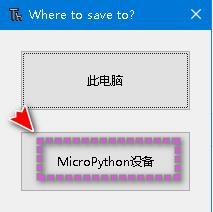ESP32 下 micropython 使用 SD卡
Posted
tags:
篇首语:本文由小常识网(cha138.com)小编为大家整理,主要介绍了ESP32 下 micropython 使用 SD卡相关的知识,希望对你有一定的参考价值。
参考技术A 此处讨论的是使用 SD 卡接口的使用,相对速度较快,不讨论以 SPI 方式的使用。直接使用会出现 CRC 校验错误的问题,报 0x107 或者 0x109 错误。 见此Issues 。
开启芯片的内置上拉也工作不稳定,偶尔会工作正常,但大部分还是出现了错误。
官方建议采取 10K 的外置上拉,但是会在 GPIO2 和 GPIO12 上会出现冲突。
首先要安装 esptool,直接 pip 安装就可以了。之后进入安装路径,运行如下的 cmd 命令,COMX 替换为你的端口号。
注意!烧录 eFuses 是不可逆的,务必提前确定你的模组使用的 3.3V Flash。 官方文档链接
会输出如下日志:
完成后你可以使用如下命令检查 efuse 的状态:
设置完成后将 GPIO2 和 GPIO12 上拉到 3.3V,我使用的是 5.1K的电阻,因为手头没找到 10K 的,阻值大小数量级差不多即可。
然后就可以操作 sd 卡上的文件了
注意拔出卡前要关闭文件, 卸载 SD 卡,否则有可能损坏文件系统。
写入:0.86 Mbyte/S
读取:1.26 Mbyte/S
注意,在使用 SD 卡,OLED 等有较大电流消耗的情况下启动 Wifi 可能会遇到 Brownout detector was triggered 错误,触发了电压保护,此时更换短一点,质量好一点的usb线,使用供电更充足的usb3.0口可以解决。
MicroPython ESP32通过sdcard模块读取SD卡实例
【MicroPython ESP32】通过sdcard模块读取SD卡实例
-
本实验基于
Thonny平台开发。esp32固件版本MicroPython v1.19.1 on 2022-06-18; ESP32 module with ESP32
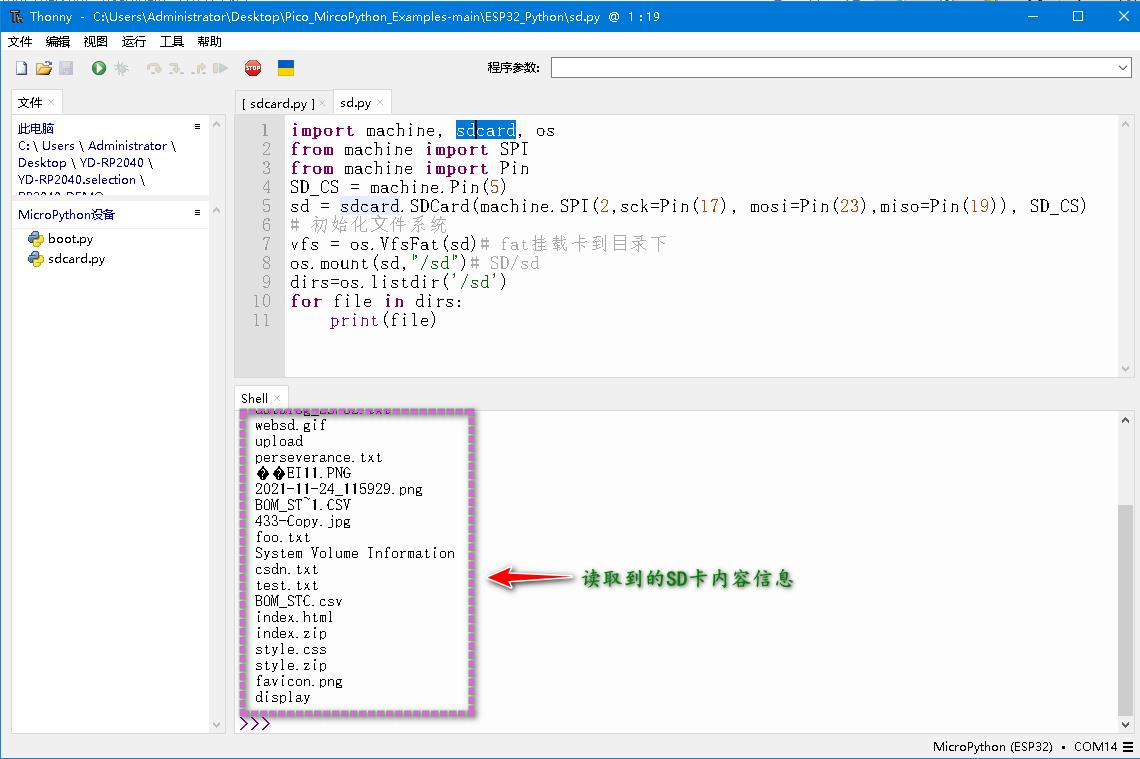
-
Micro SD卡模块(TF卡读写卡器 SPI 带电平转换芯片)
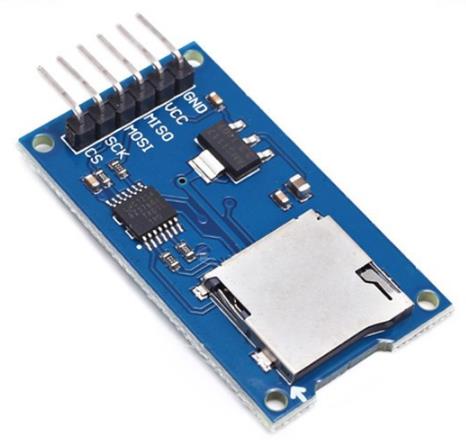
-
sdcard模块 -
MicroPython源码:https://github.com/micropython/micropython
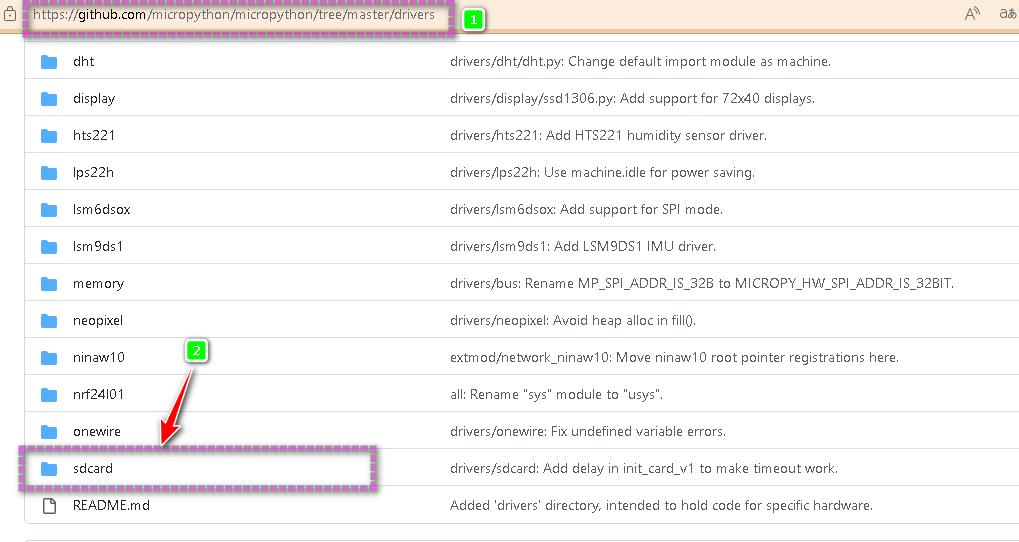
sdcard模块可以在MicroPython源码中找到。

"""
MicroPython driver for SD cards using SPI bus.
Requires an SPI bus and a CS pin. Provides readblocks and writeblocks
methods so the device can be mounted as a filesystem.
Example usage on pyboard:
import pyb, sdcard, os
sd = sdcard.SDCard(pyb.SPI(1), pyb.Pin.board.X5)
pyb.mount(sd, '/sd2')
os.listdir('/')
Example usage on ESP8266:
import machine, sdcard, os
sd = sdcard.SDCard(machine.SPI(1), machine.Pin(15))
os.mount(sd, '/sd')
os.listdir('/')
"""
from micropython import const
import time
_CMD_TIMEOUT = const(100)
_R1_IDLE_STATE = const(1 << 0)
# R1_ERASE_RESET = const(1 << 1)
_R1_ILLEGAL_COMMAND = const(1 << 2)
# R1_COM_CRC_ERROR = const(1 << 3)
# R1_ERASE_SEQUENCE_ERROR = const(1 << 4)
# R1_ADDRESS_ERROR = const(1 << 5)
# R1_PARAMETER_ERROR = const(1 << 6)
_TOKEN_CMD25 = const(0xFC)
_TOKEN_STOP_TRAN = const(0xFD)
_TOKEN_DATA = const(0xFE)
class SDCard:
def __init__(self, spi, cs, baudrate=1320000):
self.spi = spi
self.cs = cs
self.cmdbuf = bytearray(6)
self.dummybuf = bytearray(512)
self.tokenbuf = bytearray(1)
for i in range(512):
self.dummybuf[i] = 0xFF
self.dummybuf_memoryview = memoryview(self.dummybuf)
# initialise the card
self.init_card(baudrate)
def init_spi(self, baudrate):
try:
master = self.spi.MASTER
except AttributeError:
# on ESP8266
self.spi.init(baudrate=baudrate, phase=0, polarity=0)
else:
# on pyboard
self.spi.init(master, baudrate=baudrate, phase=0, polarity=0)
def init_card(self, baudrate):
# init CS pin
self.cs.init(self.cs.OUT, value=1)
# init SPI bus; use low data rate for initialisation
self.init_spi(100000)
# clock card at least 100 cycles with cs high
for i in range(16):
self.spi.write(b"\\xff")
# CMD0: init card; should return _R1_IDLE_STATE (allow 5 attempts)
for _ in range(5):
if self.cmd(0, 0, 0x95) == _R1_IDLE_STATE:
break
else:
raise OSError("no SD card")
# CMD8: determine card version
r = self.cmd(8, 0x01AA, 0x87, 4)
if r == _R1_IDLE_STATE:
self.init_card_v2()
elif r == (_R1_IDLE_STATE | _R1_ILLEGAL_COMMAND):
self.init_card_v1()
else:
raise OSError("couldn't determine SD card version")
# get the number of sectors
# CMD9: response R2 (R1 byte + 16-byte block read)
if self.cmd(9, 0, 0, 0, False) != 0:
raise OSError("no response from SD card")
csd = bytearray(16)
self.readinto(csd)
if csd[0] & 0xC0 == 0x40: # CSD version 2.0
self.sectors = ((csd[8] << 8 | csd[9]) + 1) * 1024
elif csd[0] & 0xC0 == 0x00: # CSD version 1.0 (old, <=2GB)
c_size = (csd[6] & 0b11) << 10 | csd[7] << 2 | csd[8] >> 6
c_size_mult = (csd[9] & 0b11) << 1 | csd[10] >> 7
read_bl_len = csd[5] & 0b1111
capacity = (c_size + 1) * (2 ** (c_size_mult + 2)) * (2**read_bl_len)
self.sectors = capacity // 512
else:
raise OSError("SD card CSD format not supported")
# print('sectors', self.sectors)
# CMD16: set block length to 512 bytes
if self.cmd(16, 512, 0) != 0:
raise OSError("can't set 512 block size")
# set to high data rate now that it's initialised
self.init_spi(baudrate)
def init_card_v1(self):
for i in range(_CMD_TIMEOUT):
self.cmd(55, 0, 0)
if self.cmd(41, 0, 0) == 0:
# SDSC card, uses byte addressing in read/write/erase commands
self.cdv = 512
# print("[SDCard] v1 card")
return
raise OSError("timeout waiting for v1 card")
def init_card_v2(self):
for i in range(_CMD_TIMEOUT):
time.sleep_ms(50)
self.cmd(58, 0, 0, 4)
self.cmd(55, 0, 0)
if self.cmd(41, 0x40000000, 0) == 0:
self.cmd(58, 0, 0, -4) # 4-byte response, negative means keep the first byte
ocr = self.tokenbuf[0] # get first byte of response, which is OCR
if not ocr & 0x40:
# SDSC card, uses byte addressing in read/write/erase commands
self.cdv = 512
else:
# SDHC/SDXC card, uses block addressing in read/write/erase commands
self.cdv = 1
# print("[SDCard] v2 card")
return
raise OSError("timeout waiting for v2 card")
def cmd(self, cmd, arg, crc, final=0, release=True, skip1=False):
self.cs(0)
# create and send the command
buf = self.cmdbuf
buf[0] = 0x40 | cmd
buf[1] = arg >> 24
buf[2] = arg >> 16
buf[3] = arg >> 8
buf[4] = arg
buf[5] = crc
self.spi.write(buf)
if skip1:
self.spi.readinto(self.tokenbuf, 0xFF)
# wait for the response (response[7] == 0)
for i in range(_CMD_TIMEOUT):
self.spi.readinto(self.tokenbuf, 0xFF)
response = self.tokenbuf[0]
if not (response & 0x80):
# this could be a big-endian integer that we are getting here
# if final<0 then store the first byte to tokenbuf and discard the rest
if final < 0:
self.spi.readinto(self.tokenbuf, 0xFF)
final = -1 - final
for j in range(final):
self.spi.write(b"\\xff")
if release:
self.cs(1)
self.spi.write(b"\\xff")
return response
# timeout
self.cs(1)
self.spi.write(b"\\xff")
return -1
def readinto(self, buf):
self.cs(0)
# read until start byte (0xff)
for i in range(_CMD_TIMEOUT):
self.spi.readinto(self.tokenbuf, 0xFF)
if self.tokenbuf[0] == _TOKEN_DATA:
break
time.sleep_ms(1)
else:
self.cs(1)
raise OSError("timeout waiting for response")
# read data
mv = self.dummybuf_memoryview
if len(buf) != len(mv):
mv = mv[: len(buf)]
self.spi.write_readinto(mv, buf)
# read checksum
self.spi.write(b"\\xff")
self.spi.write(b"\\xff")
self.cs(1)
self.spi.write(b"\\xff")
def write(self, token, buf):
self.cs(0)
# send: start of block, data, checksum
self.spi.read(1, token)
self.spi.write(buf)
self.spi.write(b"\\xff")
self.spi.write(b"\\xff")
# check the response
if (self.spi.read(1, 0xFF)[0] & 0x1F) != 0x05:
self.cs(1)
self.spi.write(b"\\xff")
return
# wait for write to finish
while self.spi.read(1, 0xFF)[0] == 0:
pass
self.cs(1)
self.spi.write(b"\\xff")
def write_token(self, token):
self.cs(0)
self.spi.read(1, token)
self.spi.write(b"\\xff")
# wait for write to finish
while self.spi.read(1, 0xFF)[0] == 0x00:
pass
self.cs(1)
self.spi.write(b"\\xff")
def readblocks(self, block_num, buf):
nblocks = len(buf) // 512
assert nblocks and not len(buf) % 512, "Buffer length is invalid"
if nblocks == 1:
# CMD17: set read address for single block
if self.cmd(17, block_num * self.cdv, 0, release=False) != 0:
# release the card
self.cs(1)
raise OSError(5) # EIO
# receive the data and release card
self.readinto(buf)
else:
# CMD18: set read address for multiple blocks
if self.cmd(18, block_num * self.cdv, 0, release=False) != 0:
# release the card
self.cs(1)
raise OSError(5) # EIO
offset = 0
mv = memoryview(buf)
while nblocks:
# receive the data and release card
self.readinto(mv[offset : offset + 512])
offset += 512
nblocks -= 1
if self.cmd(12, 0, 0xFF, skip1=True):
raise OSError(5) # EIO
def writeblocks(self, block_num, buf):
nblocks, err = divmod(len(buf), 512)
assert nblocks and not err, "Buffer length is invalid"
if nblocks == 1:
# CMD24: set write address for single block
if self.cmd(24, block_num * self.cdv, 0) != 0:
raise OSError(5) # EIO
# send the data
self.write(_TOKEN_DATA, buf)
else:
# CMD25: set write address for first block
if self.cmd(25, block_num * self.cdv, 0) != 0:
raise OSError(5) # EIO
# send the data
offset = 0
mv = memoryview(buf)
while nblocks:
self.write(_TOKEN_CMD25, mv[offset : offset + 512])
offset += 512
nblocks -= 1
self.write_token(_TOKEN_STOP_TRAN)
def ioctl(self, op, arg):
if op == 4: # get number of blocks
return self.sectors
if op == 5: # get block size in bytes
return 512
引脚接线说明
- 使用的是VSPI总线
| SPI | MOSI | MISO | CLK | CS |
|---|---|---|---|---|
| VSPI | 23 | 19 | 18 | 5 |
- SPI通讯
1.GND-for the ground pins.
2.VCC-for the supply voltage.
3.MISO-for the SPI Master Input Slave Output pin.
4.MOSI-for the SPI Master Output Slave Input pin.
5.SCK-for the SPI Serial Clock pin.
6.CS-for the SPI Chip Select pin.
- gnd -用于接地插脚。
- vcc- 电源电压。
- miso-用于SPI主输入从输出引脚。
- mosi -用于SPI主输出从输入引脚。
- sck -用于SPI串行时钟引脚。
- cs -用于SPI芯片选择引脚。
- esp32 Devkeit
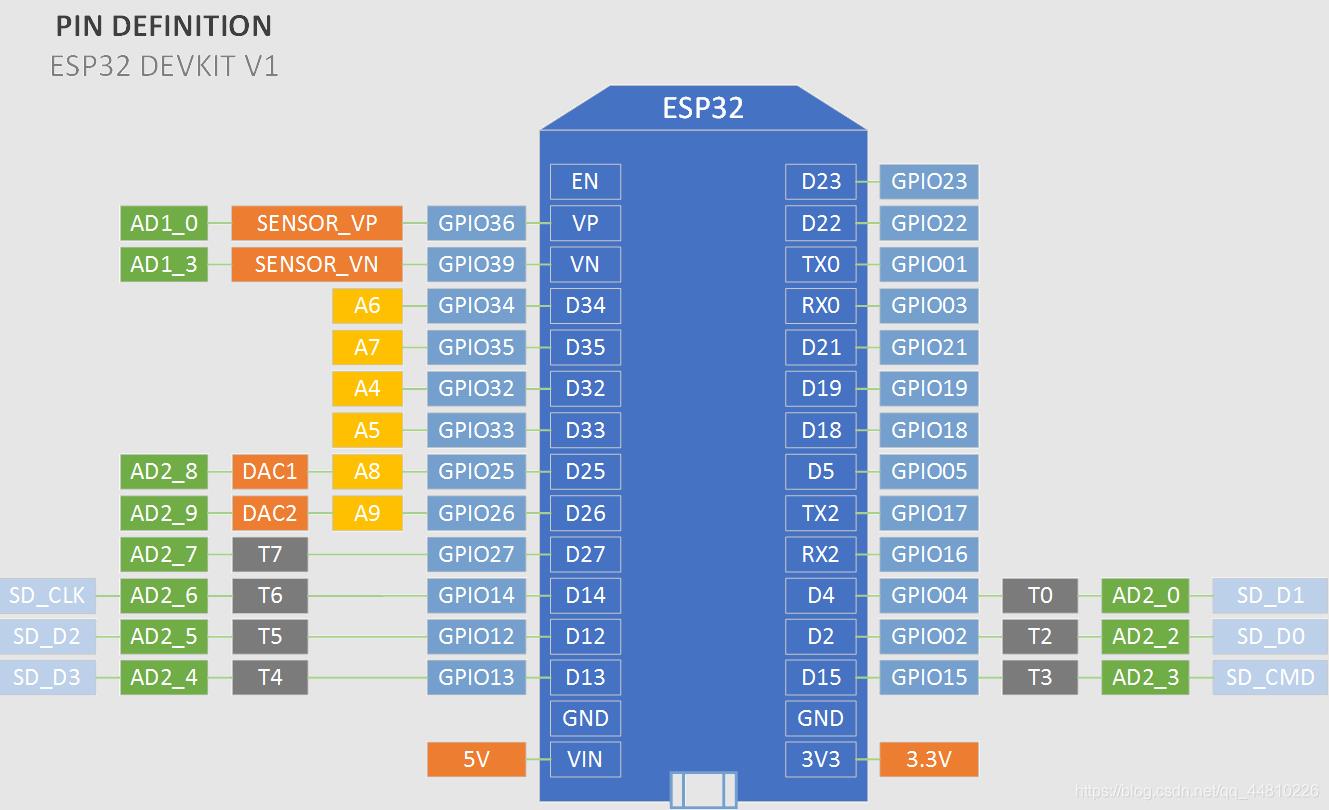
sck=Pin(17),
mosi=Pin(23),
miso=Pin(19)
SD_CS= Pin(5)
- 本实例需要引入
sdcard模块
运行代码前,需要先将
sdcard模块保存到MicroPython设备当中。
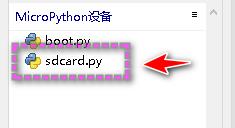
程序实例一代码
import machine, sdcard, os
from machine import SPI
from machine import Pin
SD_CS = Pin(5)
sd = sdcard.SDCard(SPI(2,sck=Pin(17), mosi=Pin(23),miso=Pin(19)), SD_CS)
# 初始化⽂件系统
vfs = os.VfsFat(sd)# fat挂载卡到⽬录下
os.mount(sd,"/sd")# SD/sd
dirs=os.listdir('/sd')
for file in dirs:
print(file)
程序实例二代码
import os, sdcard, machine
from machine import SPI
from machine import Pin
def sdtest():
SD_CS = Pin(5)
sd = sdcard.SDCard(SPI(2,sck=Pin(17), mosi=Pin(23),miso=Pin(19)), SD_CS)
vfs = os.VfsFat(sd)
os.mount(vfs, "/fc")
print("Filesystem check")
print(os.listdir("/fc"))
line = "abcdefghijklmnopqrstuvwxyz\\n"
lines = line * 200 # 5400 chars
short = "1234567890\\n"
fn = "/fc/rats.txt"
print()
print("Multiple block read/write")
with open(fn, "w") as f:
n = f.write(lines)
print(n, "bytes written")
n = f.write(short)
print(n, "bytes written")
n = f.write(lines)
print(n, "bytes written")
with open(fn, "r") as f:
result1 = f.read()
print(len(result1), "bytes read"
